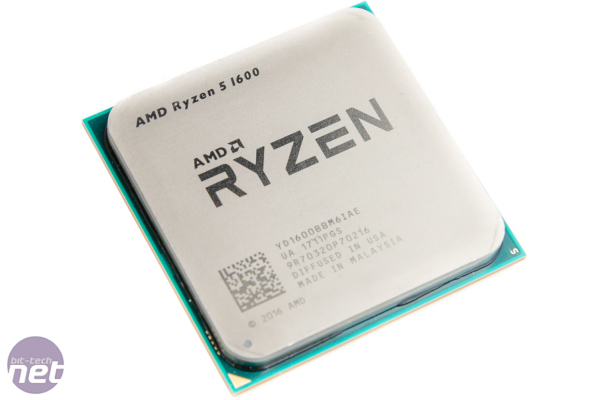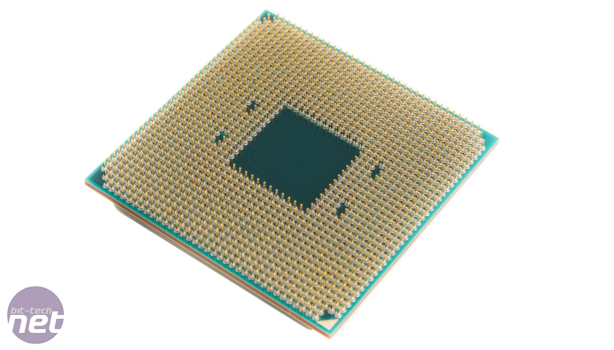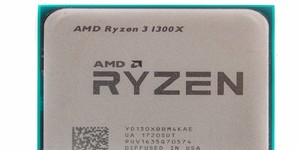
Overclocking
Results vary from CPU to CPU of course, but we were reasonably happy with a result of 3.9GHz with our Ryzen 5 1600. We started at 1.435V, and while 4GHz was stable in some tests, Terragen 4's torturous rendering test saw the system fall over after a minute or so, even though temperatures were within limits. In the end, we managed to reign the vcore in to 1.425V, with just a 50MHz deficit compared to what we managed with our Ryzen 5 1600X. It looks like that value score will be pretty high after all.Performance Analysis
In many ways, we could just copy and paste the story from our Ryzen 5 1600X review, but we do have a couple of additions to the tests and graphs. Starting with HandBrake, we shaved around six percent off the rendering time with the overclock, but even at stock speed the Ryzen 5 1600 was faster than the overclocked Intel Core i5-7600K and Ryzen 5 1500X, and when overclocked it was also quicker than the overclocked Core i7-7700K, with both Intel CPUs enjoying at least 1GHz clock speed advantages, albeit with two fewer cores.Once overclocked, the Ryzen 5 1600 also matched the vastly more expensive Core i7-6850K and snapped at the heels of the stock speed Ryzen 7 1700 too, although the latter was a beast once overclocked, leaving us in no doubt that a Ryzen 7 CPU is still a great investment if you'll be doing lots of this kind of multi-threaded work.
The PCMark 8 photo editing test likes high frequencies and is relatively multi-threaded too, so it wasn't surprising to see the Ryzen 5 1600 near the bottom with similar scores to the Core i5-7600K, which has fewer cores but a higher clock speed. The Intel Core i3-7350K was much slower at stock speed, but did manage to offer a huge hike in performance thanks to its massive overclock, but the Ryzen 5 1600's comparatively modest overclock still saw it power to fourth in the chart with a better result again than the overclocked Core i7-7700K.
CPU-Z has changed a heck of the lot since the update, and while we don't have Core i7-7700K numbers in here yet, it's plain to see that the multi-threaded prowess of AMD's six-core CPU leaves the Core i5-7600K trailing, albeit in a synthetic test. Switching to the single-threaded test, though, and those lowly clock speeds do hurt AMD with even the stock speed Core i3-7350K able to better all the six and four-core Ryzen CPUs. Thankfully, the real world isn't quite as single-threaded.
Terragen 4 is another benchmark we've not had to chop and change results for, so we've got the full spectrum here. Unsuprisingly, the Core i3-7350K just isn't worth considering at all here if you have rendering in mind - the similarly priced Ryzen 5 1500X is massively faster. Interestingly, the Core i5-7600K was able to keep pace with the Ryzen 5 1600 thanks to faster clock speeds, but then it costs more too.
Intel once again dominated the Cinebench single-threaded test results, but the Ryzen 5 1600 wasn't actually that far behind the six-core Core i7-6850K - you'd expect quad-cores, especially those from Intel, to be clocked higher anyway. Switching to the more realistic multi-threaded test, the AMD CPU unsurprisingly fares much better, beating the overclocked Core i7-7700K even at stock speed and easily keeping pace with the Core i7-6850K.
Ashes of the Singularity: Escalation has definitely swung things more in favour of AMD, with the Ryzen 5 1600 now beating the Core i5-7600K, although the latter still enjoyed top spot thanks to its massive overclock. However, even at our 1080p test resolution, things are definitely much better here for AMD compared to Ryzen's launch, and in terms of value, AMD actually has an edge here now. There are noticeable differences between top and bottom results in our other game tests, but for the most part, the Ryzen 5 1600 performs without a hitch, except in Deus Ex: Mankind Divided, which clearly likes high frequencies, giving Intel a lead. The Ryzen 5 1600 was more power-frugal than the 1600X, with our system drawing 12W less under load from the wall at stock speed and only 17W more than the Core i7-7700K, which is impressive.
Conclusion
There are several positives to talk about here. Firstly, it's great to see AMD making headway in optimising Ryzen, working both with motherboard manufacturers and game developers to improve stability and performance. The evidence is in the Ashes of the Singularity: Escalation graph, where AMD is actually on par and better value than Intel - a far cry from just a month or two ago. There's still lots of work to be done, but it will take time, as we're dealing with a completely new platform.Secondly, the Ryzen 5 1600 is just what we've hoped for - a six-core CPU that can overclock just as well as its X-edition counterpart while costing less. Finally, it offers two more cores and far better multi-threaded performance than anything Intel has in the mainstream and is a match for the Core i7-6850K which costs - wait for it - three times as much.
Intel still has a lead in some tests that love high frequencies or are just more Intel-optimised, and this is true not just when overclocked but also at stock speed too, with the occasional game and application responding better than they do to Ryzen. However, things are rarely symmetrical here - you just have to look at the graphics card market for evidence of that. Once again, though, AMD has carved out a sizeable chunk of the market, offering the best tool for the job and at a very attractive price point. This, for many, is the mid-range CPU you've been waiting for.


MSI MPG Velox 100R Chassis Review
October 14 2021 | 15:04










Want to comment? Please log in.